New therapies are exploring ways to silence tinnitus by targeting its underlying causes and leveraging the brain’s ability to adapt. Sound therapy, neuromodulation techniques like TMS, and personalized drug treatments aim to recalibrate neural pathways and reduce ringing. Innovative devices with adaptive algorithms and AI are also being developed for tailored relief. If you want to learn how these cutting-edge approaches could help quiet your tinnitus, there’s more to discover ahead.
Key Takeaways
- Emerging neuromodulation techniques like TMS, tDCS, and VNS aim to recalibrate auditory neural pathways and reduce tinnitus perception.
- Advanced sound therapy devices with adaptive algorithms personalize treatment and incorporate immersive soundscapes to mask ringing effectively.
- Researchers are exploring targeted drug therapies that modulate neurotransmitter activity to restore neural balance in the auditory system.
- Future innovations include AI-driven solutions and personalized medicine approaches tailored to individual neural profiles.
- Combining sound therapy, neuromodulation, and lifestyle practices like mindfulness enhances overall effectiveness in managing tinnitus.

Sound Oasis® Bluetooth® Tinnitus Sound Therapy System® – Sleep Better, Manage and Mask Tinnitus, 25 Built-in Sounds for Tinnitus Relief, 12-Hour Sound Duration
Play 25 Built-in Sounds: Discover a variety of sounds designed specifically for all night tinnitus relief, recommended by…
As an affiliate, we earn on qualifying purchases.
As an affiliate, we earn on qualifying purchases.
Understanding the Causes of Tinnitus
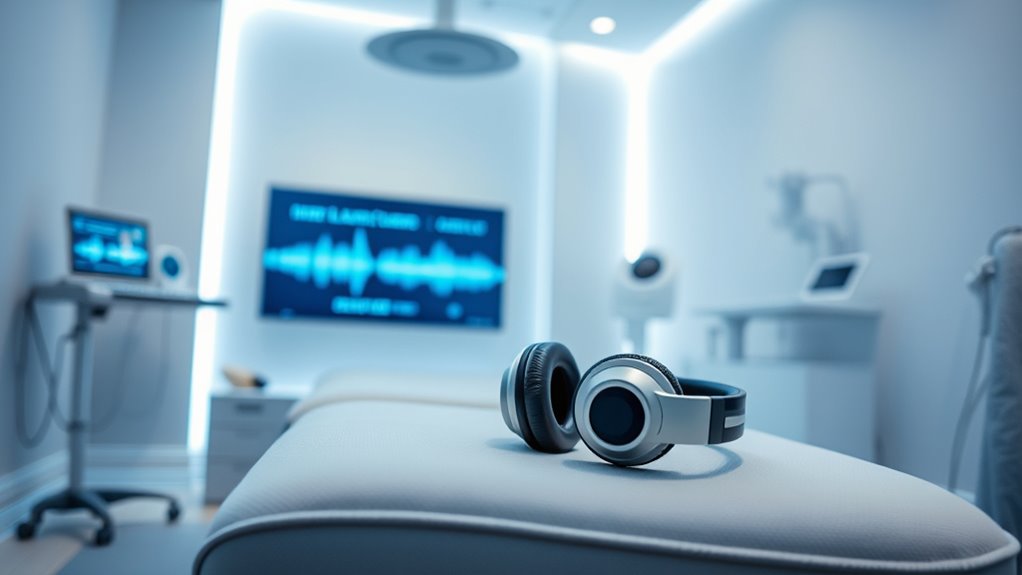
Understanding what causes tinnitus is essential if you want to find effective ways to manage or silence it. Tinnitus often originates from issues in the inner ear, where hair cells become damaged or misfire, sending confusing signals to your brain. These signals are processed in the auditory cortex, which interprets sound. When the inner ear sends distorted or abnormal signals, your brain perceives them as ringing or buzzing, even without external sound. Sometimes, damage from noise exposure, age-related hearing loss, or ear infections disrupt normal communication between the inner ear and the auditory cortex. This disruption can be linked to damage in the auditory pathways, highlighting the neurological basis of tinnitus. Recognizing this connection helps you understand that tinnitus isn’t just in your head—it’s a neurological response to inner ear dysfunction that your brain tries to interpret. Additionally, underlying conditions such as ear infections or hearing loss can contribute to the development of tinnitus, emphasizing the importance of addressing ear health. Recent studies also suggest that neurological plasticity plays a role in how tinnitus persists and may influence future treatment approaches.

Anitiate Tinnitus Relief for Ringing Ears, Ear Care Drops Promote Ear Comfort and Clarity, Effective Tinnitus Treatment Reduces Ears Noise and Improves Hearing in Both Men and Women, 1Pack-J
Best Tinnitus Relief: Our ear care drops are effective in relieving tinnitus, helping to reduce the discomfort and…
As an affiliate, we earn on qualifying purchases.
As an affiliate, we earn on qualifying purchases.
Sound Therapy and Masking Devices
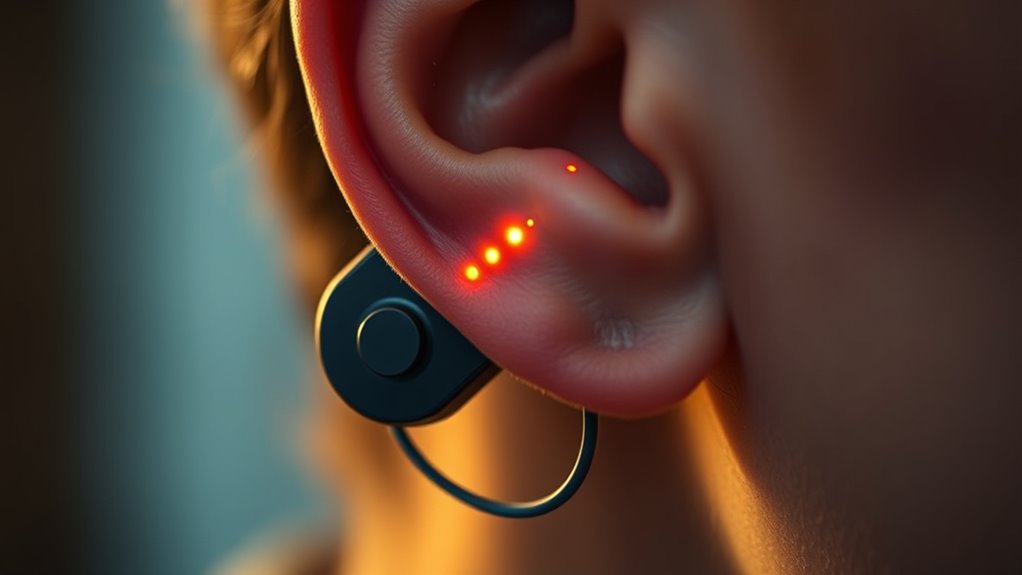
Sound therapy and masking devices offer practical options to help manage tinnitus by reducing the prominence of the ringing or buzzing sounds. Auditory masking involves playing neutral sounds or white noise to cover up tinnitus, making it less noticeable. Sound enrichment provides a gentle background noise—like nature sounds or soft music—that helps relax your brain and divert attention from the ringing. These devices are customizable, allowing you to select sounds that are most effective for you. By incorporating sound therapy into your daily routine, you can create a more tolerable sound environment, easing your perception of tinnitus. While they don’t cure the condition, they can notably improve your comfort and quality of life.
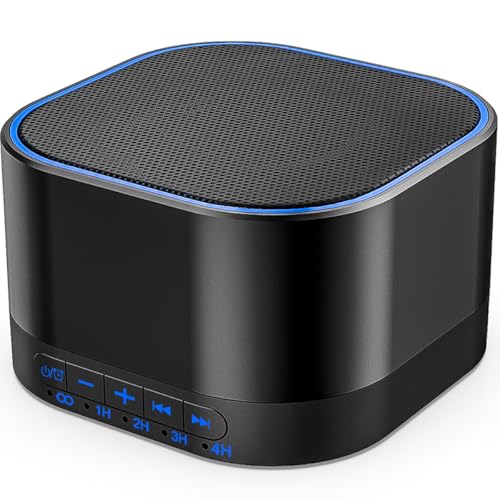
Magicteam White Noise Machine with 20 Non Looping Natural Soothing Sounds Memory Function 32 Levels of Volume Powered by AC or USB and Sleep Sound Timer Therapy for Baby Kids Adults Black
❤20 Non-Looping Sleep Sounds: White noise ,Brown noise, pink noise, blue noise, fan,brook, rain, ocean,bird and Bonfire,suitable for…
As an affiliate, we earn on qualifying purchases.
As an affiliate, we earn on qualifying purchases.
Neuromodulation Techniques in Tinnitus Treatment
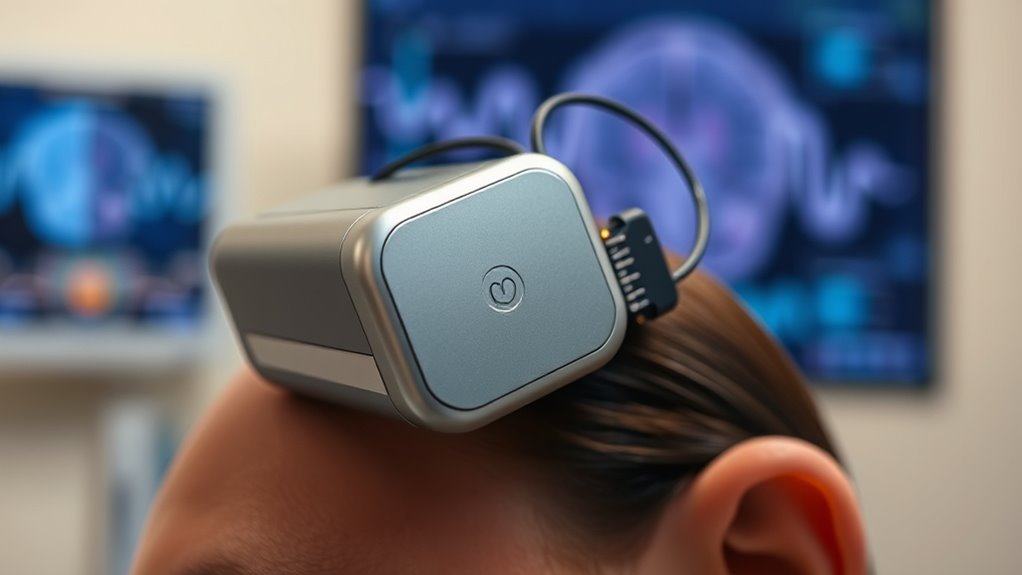
Neuromodulation techniques have emerged as promising approaches to reduce the perception of tinnitus by directly targeting the neural pathways involved. These methods modulate auditory processing, aiming to recalibrate abnormal neural activity that contributes to tinnitus perception. Transcranial magnetic stimulation (TMS) and vagus nerve stimulation (VNS) are common techniques. TMS uses magnetic fields to influence cortical activity, decreasing hyperactivity in auditory regions. VNS pairs stimulation with sound therapy to reinforce neural pathways. The table below highlights key differences:
| Technique | Mode of Action | Benefits |
|---|---|---|
| TMS | Non-invasive magnetic pulses | Reduces tinnitus perception quickly |
| VNS | Stimulates vagus nerve, paired with sound | Long-lasting effects |
| tDCS | Direct electrical current | Modulates auditory processing |
These approaches show potential for personalized tinnitus relief. Additionally, ongoing research into neural plasticity offers hope for more effective and enduring treatments in the future. Understanding brain adaptability could further enhance the effectiveness of neuromodulation therapies. Moreover, advances in personalized medicine may enable tailored treatments based on individual neural profiles.
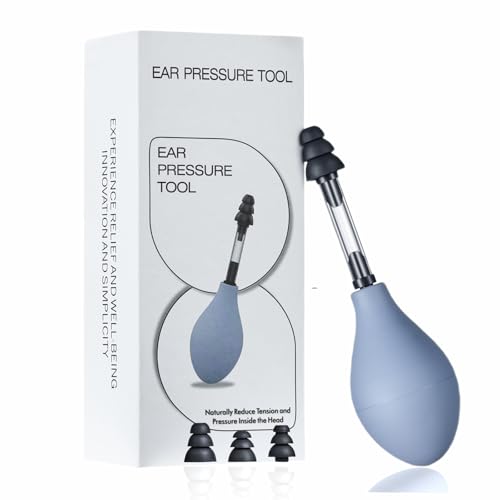
Ear Pressure Relief Suction Device, Migraine and Headache Relief Tinnitus Products with 3 Sizes, Airplane Ear Pressure Relief Through Inner Ear Pressure Balance (Grey, One Size)
Natural and safe: The ear pressure relief device offers a natural and safe solution to reduce tension, stress,…
As an affiliate, we earn on qualifying purchases.
As an affiliate, we earn on qualifying purchases.
Pharmacological Advances and Drug Therapies

Recent advances in drug development offer new hope for tinnitus relief by targeting specific neurotransmitter pathways. These therapies aim to improve effectiveness while minimizing side effects, but they also present unique challenges. Exploring these opportunities can help you understand how pharmacological options might better serve those seeking tinnitus relief. Additionally, ongoing research into neurotransmitter modulation continues to expand the possibilities for more targeted and effective treatments, potentially leading to personalized medicine approaches that cater to individual patient needs.
New Drug Developments
Advancements in pharmacology are opening new possibilities for treating tinnitus, offering hope to those who have struggled with persistent ringing in their ears. Researchers are exploring drugs that target genetic factors involved in tinnitus susceptibility, aiming to address the root causes rather than just symptoms. Additionally, new medications consider environmental triggers that can exacerbate tinnitus, such as loud noises or stress. Some experimental drugs focus on modulating nerve activity or reducing inflammation linked to these triggers. These developments could lead to personalized treatments tailored to your specific genetic makeup and environmental exposures. Moreover, understanding sound design techniques helps in developing better auditory therapies that can mask or retrain the brain’s response to tinnitus. While still in early stages, these innovative approaches hold promise for more effective, long-lasting relief, moving beyond traditional therapies and bringing hope to millions affected by chronic tinnitus.
Targeted Neurotransmitter Modulation
Targeted neurotransmitter modulation is emerging as a promising approach to treat tinnitus by directly influencing the brain’s chemical signaling. By adjusting specific neurotransmitters, you can help restore balance and improve neural communication. Tinnitus often involves a neurotransmitter imbalance that disrupts synaptic plasticity, leading to abnormal noise perception. Pharmacological strategies aim to correct this imbalance, targeting neurotransmitters like glutamate or GABA to stabilize neural activity. This approach can potentially reduce the hyperactivity in auditory pathways responsible for ringing. Because it focuses on specific chemical pathways, targeted modulation offers a more precise treatment option. As research advances, these therapies may help recalibrate neural circuits, easing tinnitus symptoms and improving your quality of life. Understanding crypto pump trends can also provide insights into market patterns that influence neural activity and perception. Additionally, ongoing studies are exploring how modulation of neurotransmitter levels may further enhance treatment efficacy, highlighting the importance of neurochemical balance in managing tinnitus symptoms.
Pharmacological Challenges and Opportunities
While targeted neurotransmitter modulation shows promise for treating tinnitus, developing effective drugs remains challenging due to the complexity of brain chemistry. You must consider potential drug interactions that could affect safety and efficacy, complicating treatment options. Designing clinical trials is also difficult because tinnitus varies greatly among individuals, making it hard to measure outcomes consistently. Additionally, identifying suitable biomarkers to track treatment response is still an ongoing challenge. Emerging mindfulness practices could offer complementary benefits by helping patients manage tinnitus-related stress and improve their quality of life. There is also a need for innovative research to better understand individual differences in tinnitus, which could lead to more personalized treatment approaches. Advances in understanding brain pathways offer hope, yet translating this knowledge into effective, safe therapies requires overcoming these pharmacological hurdles. Strategies to personalize treatment based on individual brain activity patterns are gaining interest, which could improve outcomes. Opportunities exist to explore novel compounds or repurpose existing medications, but careful trial design is essential to navigate these complexities. Advances in understanding brain pathways offer hope, yet translating this knowledge into effective, safe therapies requires overcoming these pharmacological hurdles. Ultimately, addressing drug interactions and refining clinical trial strategies will be key to developing successful tinnitus medications. Furthermore, incorporating advanced imaging techniques may aid in identifying more precise targets for future drug development.
Emerging Technologies and Future Directions

Emerging technologies like innovative sound therapy devices and neuromodulation techniques are opening new possibilities for tinnitus relief. Personalized digital interventions are also becoming more sophisticated, tailoring treatments to individual needs. These advancements hold promise for more effective and targeted approaches in the future. Additionally, the integration of AI discoveries into healthcare is expected to further enhance treatment precision and outcomes. As research continues, the development of evidence-based protocols will be crucial in establishing reliable and standardized therapies for tinnitus sufferers. Incorporating advanced data analysis can improve understanding of tinnitus patterns and optimize treatment strategies. Furthermore, ongoing studies in neuroplasticity suggest potential for reversing or reducing tinnitus symptoms through targeted therapies. Recognizing the importance of holistic approaches can also support comprehensive management of tinnitus symptoms.
Innovative Sound Therapy Devices
Innovative sound therapy devices are rapidly advancing, offering new hope for those seeking relief from tinnitus. These devices are designed to enhance auditory processing and help manage stress, which can worsen tinnitus symptoms. They use personalized soundscapes, adaptive algorithms, and real-time feedback to target your specific needs. Some devices include features like:
- Customizable sound options tailored to your tinnitus profile
- Integration with mobile apps for stress management techniques
- Noise-canceling features to reduce background distractions
- Biofeedback capabilities to monitor your stress levels
- Incorporating expert voice actors to create immersive soundscapes that improve user engagement and effectiveness. Additionally, these technologies often utilize targeted sound stimulation, which is supported by research indicating its potential to modify neural activity related to tinnitus perception. Emerging neuroplasticity techniques also hold promise for long-term relief by retraining the brain’s response to auditory signals. As research advances, growing evidence suggests that combining these approaches may enhance treatment outcomes and provide more personalized management options. Furthermore, advancements in headphone technology facilitate precise delivery of therapeutic sounds, increasing their efficacy and user comfort.
Neuromodulation Techniques Advancing
Advancements in neuromodulation techniques are opening new avenues for tinnitus treatment by directly targeting neural activity associated with the condition. These methods leverage neural plasticity to modify activity in the auditory cortex, helping to reduce the perception of ringing. Techniques like transcranial magnetic stimulation (TMS) and transcranial direct current stimulation (tDCS) aim to recalibrate abnormal neural patterns, encouraging the brain to rewire itself. As research progresses, these approaches become more precise, targeting specific neural circuits involved in tinnitus. This evolution offers hope for more effective, non-invasive treatments. By influencing neural plasticity, neuromodulation could restore balance in the auditory cortex, decreasing tinnitus perception and improving quality of life for sufferers.
Personalized Digital Interventions
Personalized digital interventions are transforming tinnitus management by tailoring treatment approaches to an individual’s specific neural and psychological profile. With digital customization, you can access app-based solutions that adapt to your unique needs, making therapy more effective. These apps often include sound therapy, cognitive exercises, and mindfulness techniques, all personalized through detailed assessments. By leveraging your data, these tools adjust in real-time to your progress, ensuring continuous optimization. This approach moves beyond one-size-fits-all treatments, giving you a more targeted and responsive experience. As technology advances, expect even smarter apps that better understand your tinnitus pattern, providing relief that’s precisely aligned with your condition. This innovation holds promise for more effective, accessible tinnitus management.
Lifestyle Changes and Complementary Approaches

Making simple lifestyle changes can markedly reduce the impact of tinnitus. Practicing mindfulness meditation helps you manage stress, which can worsen ringing sensations. Regular meditation calms your mind and reduces anxiety, providing relief. Additionally, dietary modifications play a vital role; reducing caffeine, salt, and alcohol can decrease tinnitus severity. Incorporate more antioxidants, omega-3 fatty acids, and hydration into your diet to support ear health. Managing stress levels through these approaches can lessen the intensity and frequency of tinnitus episodes. Staying active and maintaining a balanced diet not only benefits your overall health but also helps your brain better cope with tinnitus symptoms. Small, consistent changes in your daily routine can make a significant difference in quieting the ringing and improving your quality of life.
Frequently Asked Questions
How Long Does It Typically Take to See Improvements With New Tinnitus Therapies?
When trying new tinnitus therapies, your treatment timeline can vary, but many see improvements within a few weeks to a few months. The recovery period depends on the therapy and your individual response. You might notice less ringing or better coping skills early on, but consistent use and patience are key. Keep in close contact with your healthcare provider to track progress and adjust treatments if needed.
Are There Any Side Effects Associated With Emerging Tinnitus Treatment Options?
When exploring emerging tinnitus treatments, you should consider treatment risks and therapy safety. Most new therapies are designed to be safe, but some may cause side effects like mild discomfort, dizziness, or changes in hearing. Always discuss these potential side effects with your healthcare provider to understand the risks involved. Staying informed helps you make safer choices, ensuring the therapy’s benefits outweigh any possible side effects.
Can Tinnitus Be Completely Cured or Only Managed Effectively?
Imagine you’ve tried various treatments for tinnitus, but the ringing persists. While some cases, like specific tinnitus causes, might see complete relief, most treatments only manage symptoms due to treatment limitations. Currently, there’s no universal cure, but new therapies show promise. You can often regain quality of life by effectively managing tinnitus, even if total eradication remains challenging. Keep exploring options; progress is ongoing in this field.
What Are the Costs and Accessibility of the Latest Tinnitus Treatments?
You might wonder about treatment affordability and accessibility challenges with the latest tinnitus therapies. These new options can be costly, and insurance often doesn’t fully cover them, making affordability a concern. Accessibility challenges include limited availability in some regions and the need for specialized clinics. While innovative treatments show promise, understanding their costs and overcoming barriers helps you make informed decisions about managing your tinnitus effectively.
How Do Psychological Factors Influence the Success of Tinnitus Therapies?
Psychological factors greatly influence your success with tinnitus therapies. If you have strong psychological resilience, you’re better equipped to manage the emotional stress caused by tinnitus, improving treatment outcomes. Emotional support from friends, family, or professionals can reduce anxiety and depression, making therapy more effective. Your mental attitude and support system help you stay committed and positive, ultimately increasing the chances of quieting the ringing and improving your quality of life.
Conclusion
As you explore these new therapies, remember that silence isn’t just the absence of sound—it’s a promise of peace waiting to be fulfilled. By embracing emerging treatments and lifestyle changes, you’re not just silencing tinnitus; you’re reclaiming your life from its relentless grip. Like a lighthouse guiding you through stormy seas, these innovations light the path to quiet and calm, reminding you that even the loudest ringing can eventually fade into silence.










